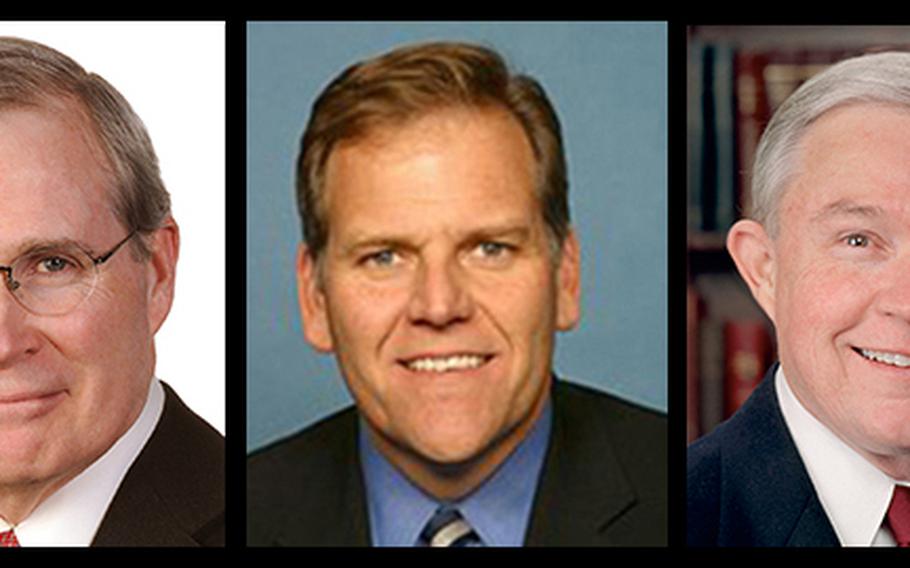
From left, former national security adviser Stephen Hadley, former U.S. House Rep. Mike Rogers and Sen. Jeff Sessions, R-Ala. ()
WASHINGTON — A former national security adviser for George W. Bush and congressional defense leaders are considered front-runners for Defense Secretary for President-elect Donald Trump , experts said Tuesday.
Former national security adviser Stephen Hadley is a likely choice for the new Trump administration, defense analysts said. Hadley has worked in the Pentagon under multiple Republican administrations since the 1970s. His more recent assignments include serving as assistant secretary of defense, focused on NATO strategic issues, under President George H.W. Bush from 1989 to 1993 and as the former national security adviser to President George W. Bush from 2005 to 2009.
Unlike several top Republican defense officials from both Bush administrations, Hadley did not break from the party to endorse Democratic nominee Hillary Clinton. Hadley revealed a little of his thinking in a Politico-sponsored panel in August, when he addressed the choices that Republicans faced and the reasons that some stayed quiet or aligned with Trump. Those advisers “want to have a voice in where the party heads,” Hadley said at the time.
Mackenzie Eaglen, a senior defense analyst for the nonpartisan American Enterprise Institute think tank in Washington, said Hadley is one of several likely choices for the post.
Hadley’s role as one of the Republican co-chairs of the bipartisan 2010 Quadrennial Defense Review Independent Panel -- a deep dive into how the U.S. military and defense policy should be postured to face future threats -- should have him “certainly on any short list,” Eaglen said.
Hadley “would bring a lot of experience,” said Larry Korb, a former assistant secretary of defense for manpower under President Ronald Reagan who is a senior defense analyst at the progressive Center for American Progress think tank in Washington.
There are also several key contenders from Congress, analysts said. Former House Rep. Mike Rogers, R-Mich., has been a vocal supporter for Trump and is part of the president-elect’s transition team. Rogers was chairman of the House Intelligence Committee and is “very sharp and widely respected,” Eaglen said. Rogers is also a likely nominee to run the Central Intelligence Agency but is considered a defense secretary contender Eaglen said.
Sen. Jeff Sessions, R-Ala., a senior member of the Senate Armed Services Committee, was also a vocal Trump supporter during the campaign and considered another front-runner, Eaglen and Korb said.
“His name would have to go on any short list,” Eaglen said.
One of Trump’s most vocal defense supporters, retired Lt. Gen. Mike Flynn, is not eligible for the post because U.S. law requires that any former military official seeking the position must have been retired for seven years before serving again. Flynn retired from the military in 2014. However, Congress could waive the requirement.
Beyond defense secretary, both analysts suggested that former House Armed Services subcommittee on seapower chairman Rep. Randy Forbes, who was defeated in his Virginia primary earlier this year, would be a strong choice for Secretary of the Navy.
Given the unpredictability of this election, Eaglen cautioned against going with conventional wisdom, noting Trump may seek out a complete outsider, such as a head of a Fortune 100 company, to run the Pentagon, which is the nation’s largest government agency and accounts for half of its discretionary spending.
Trump’s win appeared to change the national security landscape overnight with at least two world leaders who had become increasingly at odds with the United States. Russian President Vladimir Putin was one of the first leaders to call to congratulate Trump, according to news reports. “Russia is ready and wants to restore full-format relations with the United States,” Putin said according to the state-controlled news agency Sputnik International.
The U.S. and Russia have been at odds over the way forward in Syria, where both nations are conducting airstrikes. Russia strikes appeared to be in support of Syrian president Bashar Assad. The U.S. airstrikes have been against the Islamic State group but also in support of forces that seek the removal of Assad.
On Tuesday, France’s foreign minister said the U.S. would need to clarify its strategy on Syria under a Trump presidency, according to Reuters.
In the Philippines, the United States’ 60-year alliance with the strategic Pacific island nation had chilled after the election of President Rodrigo Duterte, who has more closely aligned his country with China. Early Wednesday, Duterte congratulated Trump and said his government “looks forward to working with the incoming administration for enhanced Philippines-U.S. relations anchored on mutual respect, mutual benefit and shared commitment to democratic ideals and the rule of law.”
Trump’s election also raised questions in Europe. One of Trump’s campaign platforms was that the U.S. should not contribute as much to NATO.
Michael O’Hanlon, a senior defense analyst at the Brookings Institution, a public-policy research group in Washington, said before a defense secretary pick is made, Trump needs to signal to allies what the way forward could look like.
“Trump’s big question now is, do I really disrupt everything about America’s role in the world, or do I walk back some of the ideas about cutting allies loose and focus instead on my economic message?” O’Hanlon said. “That’s the philosophical-existential question that must be answered above all others.”
copp.tara@stripes.com Twitter:@TaraCopp